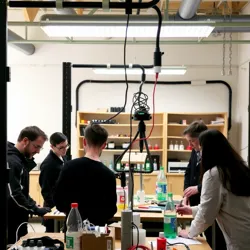Biohacker Collectives

Biohacker Collectives are community-driven groups focused on the exploration and innovation of biotechnology outside traditional academic and corporate environments. These collectives bring together enthusiasts, scientists, and hobbyists to work on do-it-yourself (DIY) biology projects, often with the goal of democratizing access to biotechnology and fostering open-source collaboration.
Origins and Development
The emergence of Biohacker Collectives can be traced back to the early 21st century, in tandem with the rise of the Biotechnological Renaissance. As biotechnological tools became more accessible and affordable, individuals with a keen interest in biology began forming grassroots networks to share resources, knowledge, and skills. These collectives often operate in shared spaces known as biohacker spaces or community labs, where members can experiment and innovate collaboratively.
Objectives and Activities
Democratizing Biotechnology
One of the primary goals of Biohacker Collectives is to make biotechnology accessible to everyone, regardless of their educational background or financial resources. By promoting open-source biology projects, these groups aim to empower individuals to contribute to scientific discovery and innovation.
DIY Biology Projects
Biohacker Collectives engage in a variety of DIY biology projects, ranging from genetic engineering to bioinformatics. Common projects include creating low-cost laboratory equipment, developing open-source protocols for gene editing, and experimenting with synthetic biology to produce novel biomaterials.
Education and Outreach
In addition to research and experimentation, these collectives often focus on education and outreach. They host workshops, seminars, and public events to teach the fundamentals of biotechnology and raise awareness about its potential applications. This educational component plays a crucial role in demystifying complex scientific concepts and encouraging broader public participation.
Ethical Considerations
While Biohacker Collectives advocate for open and accessible science, they also face ethical and safety challenges. Ensuring responsible conduct and adherence to biosafety standards is paramount, particularly when dealing with potentially hazardous biological materials. These groups often collaborate with regulatory bodies to establish guidelines and best practices.
Impact on Society
Biohacker Collectives have contributed significantly to the Neo-Bio Frontiers by facilitating grassroots innovation and fostering a culture of scientific curiosity. They have also inspired a new generation of biotechnologists and entrepreneurs who are driving forward the field of biotechnology with fresh perspectives and unconventional approaches.
See Also
- Transhumanist Movement
- DIY Biology
- Neo-Bio Frontiers
- Open-Source Science
- Community Labs
- Synthetic Symphonies
References
For more insights into the impact and activities of Biohacker Collectives, consider exploring related topics such as open-source science initiatives and the broader implications of biotechnology democratization. These collectives represent a dynamic intersection of science, community, and innovation, offering a glimpse into the future of collaborative scientific exploration.